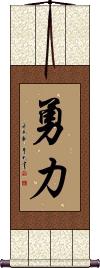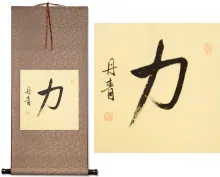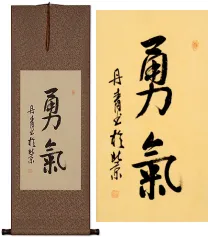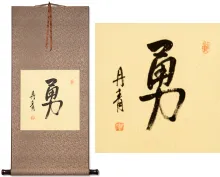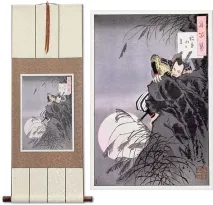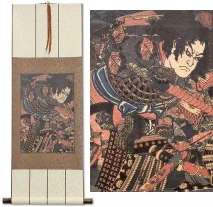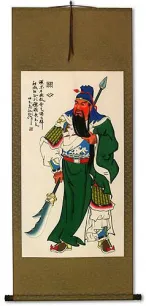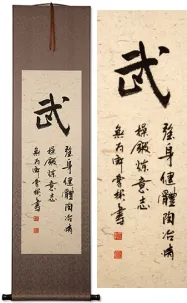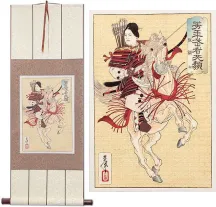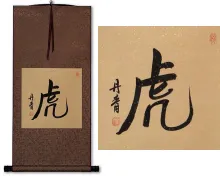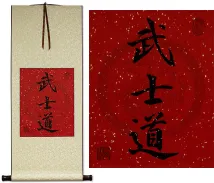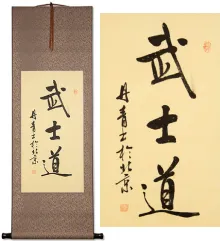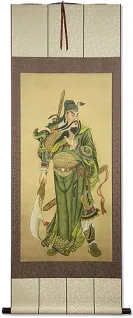Many custom options...
And formats...

Strength Courage in Chinese / Japanese...
Buy a Strength Courage calligraphy wall scroll here!
Personalize your custom “Strength Courage” project by clicking the button next to your favorite “Strength Courage” title below...
Strength and Courage
Courage and Strength
Strength and Courage
This in-stock artwork might be what you are looking for, and ships right away...
Gallery Price: $65.00
Your Price: $39.77
Gallery Price: $79.00
Your Price: $43.88
Gallery Price: $65.00
Your Price: $39.88
Gallery Price: $108.00
Your Price: $59.88
Gallery Price: $108.00
Your Price: $59.88
Gallery Price: $200.00
Your Price: $79.88
Gallery Price: $158.00
Your Price: $87.77
Gallery Price: $108.00
Your Price: $59.88
Gallery Price: $100.00
Your Price: $49.88
Gallery Price: $65.00
Your Price: $39.88
Gallery Price: $72.00
Your Price: $39.88
Gallery Price: $87.00
Your Price: $47.88
Gallery Price: $108.00
Your Price: $59.88
Not the results for Strength Courage that you were looking for?
Below are some entries from our dictionary that may match your Strength Courage search...
| Characters If shown, 2nd row is Simp. Chinese |
Pronunciation Romanization |
Simple Dictionary Definition |
勇力 see styles |
yǒng lì yong3 li4 yung li yuuryoku / yuryoku ゆうりょく |
More info & calligraphy: Courage and Strengthcourage; (personal name) Yūri |
筋骨 see styles |
jīn gǔ jin1 gu3 chin ku kinkotsu; sujibone きんこつ; すじぼね |
muscles and bones; physique; strength; courage (1) muscles and bones; body build; physique; (2) (すじぼね only) (See 軟骨・1) cartilage |
もりもり see styles |
morimori もりもり |
(adv,adv-to) (1) (onomatopoeic or mimetic word) (eating) heartily; (2) (onomatopoeic or mimetic word) energetically; vigorously; (working) hard; enthusiastically; (adv,adv-to,vs) (3) (onomatopoeic or mimetic word) bulging (muscles); welling up (of strength, courage, etc.) |
Variations: |
morimori; morimori もりもり; モリモリ |
(adv,adv-to) (1) (onomatopoeic or mimetic word) (eating) heartily; (adv,adv-to) (2) (onomatopoeic or mimetic word) energetically; vigorously; (working) hard; enthusiastically; (adv,adv-to,vs) (3) (onomatopoeic or mimetic word) bulging (muscles); welling up (of strength, courage, etc.) |
Variations: |
furishiboru ふりしぼる |
(transitive verb) to use to the full (one's voice, energy, etc.); to muster all of (one's strength, courage, etc.); to summon all of; to exert fully; to strain (one's voice) |
The following table may be helpful for those studying Chinese or Japanese...
| Title | Characters | Romaji (Romanized Japanese) | Various forms of Romanized Chinese | |
| Strength and Courage | 力量和勇氣 力量和勇气 | lì liàng hé yǒng qì li4 liang4 he2 yong3 qi4 li liang he yong qi liliangheyongqi | li liang ho yung ch`i lilianghoyungchi li liang ho yung chi |
|
| Courage and Strength | 勇力 | yuu ri / yuuri / yu ri | yǒng lì / yong3 li4 / yong li / yongli | yung li / yungli |
| Strength and Courage | 力と勇氣 力と勇気 | riki to yu ki rikitoyuki | ||
| In some entries above you will see that characters have different versions above and below a line. In these cases, the characters above the line are Traditional Chinese, while the ones below are Simplified Chinese. | ||||
Successful Chinese Character and Japanese Kanji calligraphy searches within the last few hours...

